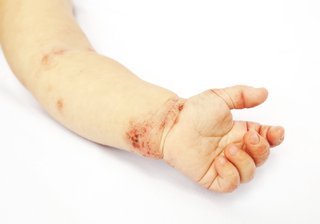Eczema is when your child's skin becomes inflamed, itchy, dry, red and cracked. Babies (including newborns) and children can get it.
Symptoms
The main symptom is itching. A severe itch can also cause disturbed sleep and irritability.
Your child's skin may look dry, cracked and sore. It may look like a rash.
If your child has white or light skin, eczema can make the skin red. On darker skin, eczema can make the skin dark brown, purple or grey. It can be hard to see eczema on darker skin.
They may also have scratch marks and bleeding. Their skin may appear wet if it's very irritated or infected.
Eczema is most commonly found:
- on the face
- in the creases of necks, elbow joints and the backs of knees
But any area of your child's skin can be affected.

Diagnosis
Non-urgent advice: Contact your GP if your child:
- has symptoms of eczema
Your GP can diagnose eczema by looking at the skin. Blood and skin tests are not usually needed.
Your GP may dab your child's skin with a swab (like a cotton bud) to see if the eczema is infected. This should not cause your child any pain.
Treatment
Your GP may prescribe:
- lotions, creams or ointments (emollients) to moisturise your child’s skin
- steroid creams - to help reduce itching and redness
- antihistamines - to reduce itchiness so that your child can sleep
- cotton bandages - to stop creams rubbing off and prevent your child from scratching
- antibiotics - if your child's eczema becomes infected
Children who have eczema need their skin moisturised at least 1 to 2 times every day.
Talk to your pharmacist about treatments for eczema in babies and children.
Non-urgent advice: Contact your GP if your child:
- is having a flare up that is not getting better after 2 to 3 days of regular treatment
- oozing, crusted or broken areas of skin, or if the area around the eczema looks red or feels hot - their skin may be infected
- is causing you to be worried because of their health or skin
Emollients and fire safety
Lotions, creams or ointments used to moisturise your child’s skin are also known as emollients.
Emollients are very effective at treating dry skin conditions, such as eczema. But there is a fire risk with emollients, especially those which contain paraffin.
Warning
Do not smoke near your baby or allow them near naked flames:
- while there is emollient on them
- if they are wearing clothes or bandages that may have emollient on them
Emollients will not cause a fire on their own. But a build-up of emollients on dressings, clothing and bedding can quicken the speed of a fire.
Wash clothing or fabric at a high temperature. It may reduce emollient build-up. But it might not totally remove it.
Things you can do to help their eczema
There are things you can do that can help reduce your baby or child's discomfort.
Do
-
keep their fingernails short to reduce the damage to their skin from scratching
-
wash them with a soap substitute, such as aqueous cream or silcocks base
-
use non-biological detergent and a double rinse cycle when washing their clothes or bedding
-
avoid herbal, 'natural' or alternative creams - they may contain bacteria or high doses of steroids and can make eczema worse
-
rinse and dry them well after swimming
-
dress them in cool, breathable fabrics, such as cotton
-
keep their room temperature at the lower end of what is recommended - around 18 degrees Celsius
-
keep them away from anyone with a cold sore - the cold sore virus can cause eczema to become infected
-
use extra moisturiser on areas your child scratches a lot
-
avoid anything you know that causes your child’s eczema to get worse
Causes
Atopic eczema (atopic dermatitis) is the most common form of eczema. It's caused by a combination of things. Your child may have very dry skin as their skin is not able to hold onto moisture. This might make their skin more likely to react to certain triggers. This could make their skin itchy and sore.
Eczema can also be caused by a problem with how the skin works. The skin has a barrier that keeps moisture in and germs out. If someone has eczema, their skin barrier does not work very well. This means their skin can become dry and bacteria can get in.
Eczema triggers
Some things can cause your baby or child's eczema to get worse, or 'flare up'.
These include:
- being too hot
- wearing wool
- pets
- strong or scented soaps and detergents
- teething
- getting a virus
- stress
- dust
Very rarely, food allergies can trigger eczema. Ask your GP to refer you to an allergy specialist if you think your child has a food allergy. Keep a food diary to see if there's an obvious link between specific foods and eczema getting worse.
Do not cut food groups from your child's diet unless you’ve been advised to by a doctor or specialist nurse. This could affect your baby’s growth and development.
